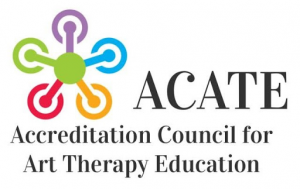June 24, 2024 | Eliza Homer, PhD, ATR-BC, LCPC, NCC, Director, ACATE
Overview of the Substantive Changes to ACATE Policies and Procedures
At its May meeting, ACATE approved four substantive policy changes to improve the accreditation process and provide more transparency of timelines and thresholds.
These updates and additions to ACATE Policies and Procedures can be seen in detail on the ACATE/CAAHEP website on the page numbers indicated.


III.A. Application for Initial Accreditation, pp. 7-9
ACATE policy has required programs seeking initial accreditation to have graduated a cohort of students before submitting an application. This past policy worked well as ACATE moved existing art therapy programs into their initial accreditation. With previously existing programs now accredited, ACATE now is receiving applications from newly created programs. The updated policy allows greater flexibility in initial accreditation applications from newly created programs by allowing submissions: 1) prior to admitting students, 2) after enrolling students but before graduating its first cohort, or 3) after graduating its first cohort.
III.B. Timeline for Continuing Accreditation Review, p. 10
As the required continuing accreditation review approaches for the first art therapy programs that were awarded initial accreditation, ACATE established a timeline for the review. Starting with the eight-year anniversary of initial accreditation and working backward, ACATE now has a two-year standardized timeline for the continuing accreditation review process that completes the self-study and site visit review by the program’s accreditation anniversary date.
VI.B. Compliance Warnings and Probationary Accreditation, p. 20
ACATE added a policy addressing warnings associated with noncompliance with standards. The process parallels the policy for administrative warnings: noncompliance after two official warnings results in a recommendation of probationary accreditation to CAAHEP.
VI.E. Outcomes Thresholds, p. 24
ACATE expanded and clarified the council’s thresholds for required outcomes and the thresholds for the data-generating processes used for achieving the outcomes.
For more information contact: Eliza Homer, PhD, ATR-BC, LCPC, NCC, Director, Accreditation Council for Art Therapy Education, at acatecouncil@gmail.com
